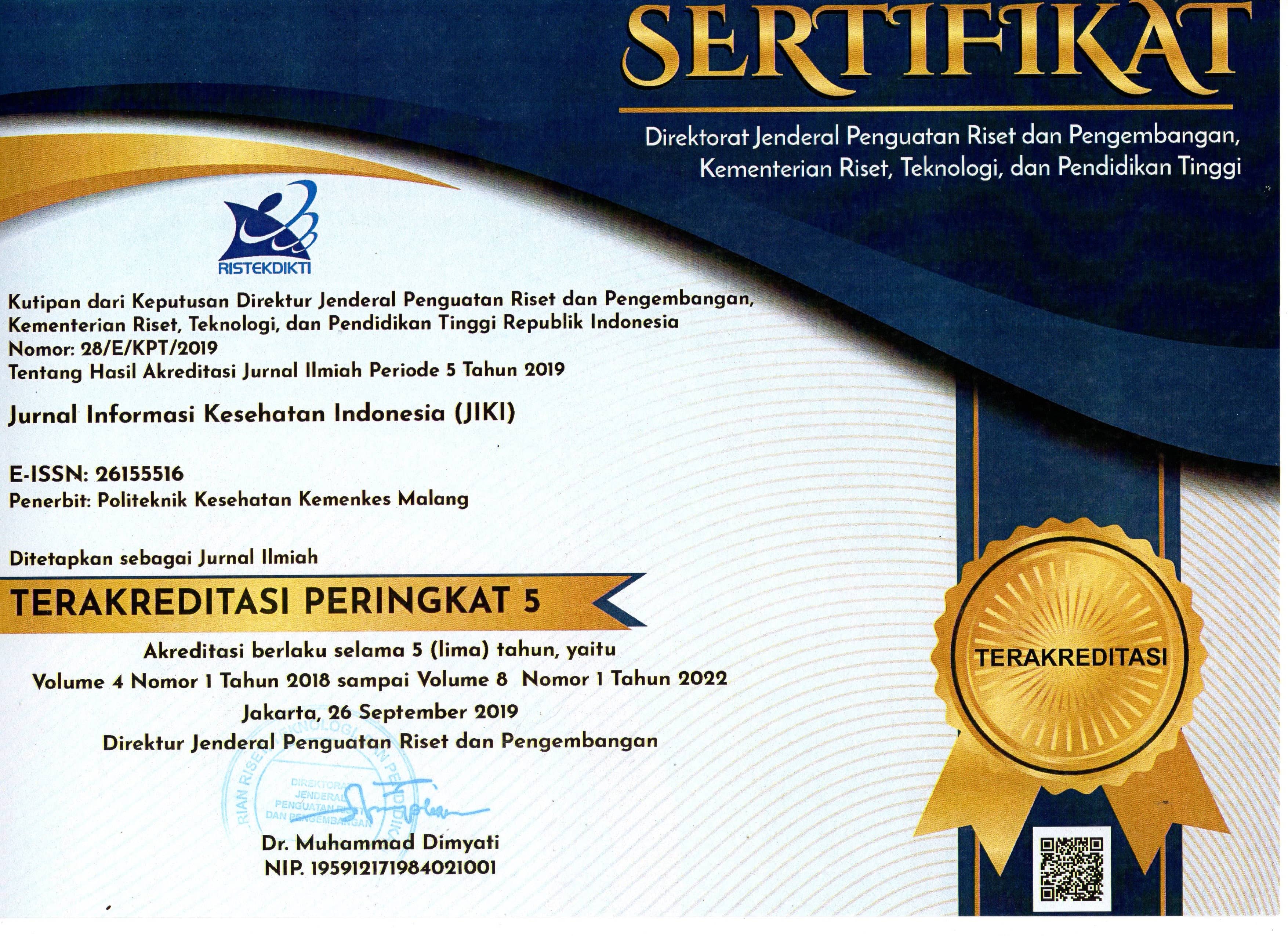Development Of A Mental Health Screening App
DOI:
https://doi.org/10.31290/jiki.v10i2.5039Abstract
Background: Mental health problems in Indonesia, especially among students as a vulnerable group, require serious attention. Mental health surveillance, such as screening, is a preventive and promotive measure to reduce the risk of mental disorders. The utilization of mobile technology is an effective strategy used for rapid and interactive surveillance implementation. The purpose of this study is to develop a mobile application for mental health screening using the Depression Anxiety Stress Scales-21 (DASS-21) instrument.
Subjects and Method: The method used in the development of this application is Rapid Application Development (RAD) with the Depression Anxiety Stress Scales-21 (DASS-21) instrument. Researchers took samples using purposive sampling technique, which involved 5 experts (health promotion experts, psychologists, media experts, application experts, surveillance data experts) and 5 student members of UKM-PIKMA youth mental health division as respondents.
Results: The application development was carried out through several stages, and succeeded in obtaining an average eligibility score from experts of 91.63% (very feasible) and students of 94.72% (very feasible). The results of the Intraclass Correlation Coefficient (ICC) test showed good reliability with a coefficient of 0.757 from experts and 0.810 from students. This application namely mental care can finally be accessed in Google Play Store.
Conclusion: This research successfully developed an application called “Mental Care” with an Android-based operating system. The development of mental health applications is feasible to use to support mental health surveillance activities in students.
Keywords: Android, Mental Health Application, RAD, Screening.
References
Carbone, S. (2020) 'Evidence review: The primary prevention of mental health conditions'.
Cverkovié, J. and Cvetkovié, M. (2019) 'E valuation of UML diagrams for test cases generation: Case study on depression of internet addiction', Physica A: Statistical Mechanies and its Applications, 525.pp. 1351-1359.
Junker, S. et al. (2023) 'Development of a prototype for high-frequency mental health surveillance in Germany: data infrastructure and statistical methods', Frontiers in Public Health, 11.
Koo, T.K and Li, M.Y. (2016) "A Guideline of Selecting and Reporting Intraclass Correlation Coefficients for Reliability Research', Journal of Chiropractic Medicine, 15(2). pp. 155-163 Available at: https://doi.org/https://doi.org/10.1016/j.jcm.2016.02.012.
Latukolan, M.L.A., Arwan, A. and Ananta, M.T. (2019) Pengembangan Sistem Pemetaan Otomatis Entity Relationship Diagram Ke Dalam Database', Jurnal Pengembangan Teknologi Informasi dan Ilmu Komputer, 3(4 SE-), pp.4058- 4065. Available at: https://j-ptik.ub.ac.id/index.php/j-ptiik/article/view/5117.
Liljequist, D., Elfving, B. and Skavberg Roaldsen, K. (2019) 'Intraclass correlation A discussion and demonstration of basic features.', PloS one, 14(7), p. e0219854. Available at: https://doi.org/10.1371/journal.pone.0219854.
Lovibond, S. and Lovibond, P. (1995) Manual for the depression anxiety and stress scales (DASS21). Second. Sydney: NSW: Psychology Foundation of Australia.
Martin, I. (1991) Rapid Application Development. Macmillan Publishing Company. Available at: https://books.google.co.id/books?id=9BFJPgAACAAJ.
McLafferty, M. et al. (2017) 'Mental health, behavioural problems and treatment seeking among students commencing university in Northern Ireland', PLoS ONE, 12(12), pp.1-14 Available at: https://doi.org/10.1371/journal.pone.0188785.
O'Reilly, M. dkk. (2018) 'Tinjauan intervensi promosi kesehatan mental di sekolah', Psikiatri Sosial dan Epidemiologi Psikiatri, 53(7), hlm. 647-662. Tersedia di: https://doi.org/10.1007/s00127-018-1530-1.
Pratama, O.T. and Anandita, A. (2021) 'Pengaruh Kapasitas Sumber Daya Manusia, Pengendalian Intern Akuntansi, Pemanfaatan Teknologi Informasi Dan Pengawasan Keuangan Dacrah Terhadap Keterampilan Dalam Pelaporan Keuangan Pemerintah Daerah Kabupaten Sukoharjo (Studi Empiris Pada Badan Keuangan D`, JURNAL EKOMAKS Jurnal Ilmu Ekonomi Manajemen dan Akuntansi. 10(1), pp. 27-32. Available at: https://doi.org/10.33319/jeko.v10i1.85.
Salim, M.F. et al. (2021) Pengembangan Sistem Informasi Surveilans Demam Berdarah Dengue Berbasis Mobile sebagai Sistem Peringatan Dini Outbreak di Kota Yogyakarta', Jurnal Kesehatan Vokasional, 6(2), p. 99. Available at: https://doi.org/10.22146/jkesvo.61245.
Silberschatz, A., Korth, H.F. and Sudarshan, S. (2020) Database System Concepts (7th edition), Database.
Taylor, D M. et al. (2020) 'Research skills and the data spreadsheet: A research primer for low- and middle-income countries.', African journal of emergency medicine : Revue africaine de la medecine d'urgence, 10(Suppl 2), pp. $140- $144. Available at: https://doi.org/10.1016/j.afjem.2020.05.003.
Waykar, Y. (2015) 'Role of use case diagram in software development', International Journal Of Management and Economics [Preprint]. Available at: https://www.researchgate.net/publication/32991847_role_of_use_case_diagram_in_software_development.
Wenzel, A. (2017) 'Depression', The SAGE Encyclopedia of Abnormal and Clinical Psychology [Preprint] Available at: https://doi.org/10.4135/9781483365817.n886.
WHO (2018) ‘mHealth. Use of appropriate digital technologies for public health' PLoS Medicine. 10(1). pp. 1-5. Available at: https://doi.org/10.2337/dc11- 0366.4.
World Health Organization (WHO) (2023b) Health Mental. Available at: https://www.who.int/southeastasia/health-topics/mental-health (Accessed: 26 July 2023).
Zhang. Y. et al. (2023) A spreadsheet tool for designing statistical quality control programs based on patient risk parameters', Clinical Biochemistry, 116, pp. 52-58. Available at. https://doi.org/https://doi.org/10.1016/j.clinbiochem.2023.03.009.












